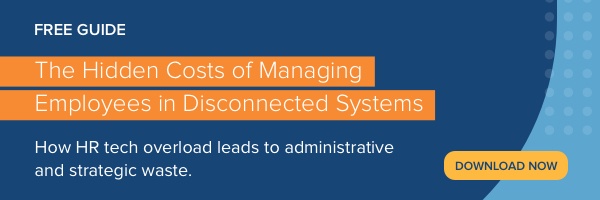
Performance reviews—whether conducted annually, quarterly, or on some other schedule—are an effective way to ensure employees understand how their performance aligns with expectations.
Managers are always in the position to give feedback to their direct reports, but they also need to receive feedback in performance reviews. When done well, performance reviews can help managers at all levels improve performance and earn recognition for their accomplishments.
Benefits of an Effective Manager Performance Review
It’s no secret that performance feedback can help any employee understand how their performance aligns with expectations. But for managers, a well-delivered performance review can impact their individual performance and the performance of their team.
When managers receive feedback that helps them improve as leaders, they can better support and coach their teams, resulting in benefits such as:
- Lower turnover: Employees may be less likely to leave the organization when their manager is an effective leader.
- Higher team engagement: Research shows that managers play a major role in team engagement. According to Gallup, managers account for 70 percent of the variance in employee engagement across business units.
- Higher team performance: When managers receive targeted feedback that improves their performance, they can translate that feedback to support the performance of their whole team.
Common Performance Criteria in a Manager Performance Review
As is true of all performance reviews, there is no universal set of criteria that provides meaningful insights about every employee. The criteria you cover in a review should directly pertain to the manager you’re reviewing, such as their career trajectory, goals, and particular strengths and development areas.
If you’re not sure where to start, here are some of the traits and skills you should include in a manager performance review:
Leadership Skills
- Delegation
- Accountability
- Decision-making
- Problem-solving
Communication Skills
- Speaking, listening, and writing
- Giving and receiving feedback
Interpersonal Skills
- Approachability
- Teamwork
- Enthusiasm
- Confidence
- Empathy
Organizational Skills
- Attention to detail
- Time and stress management
- Project management
Alignment with Company Goals
- Support of company values and mission
- Strategic planning
- Implementation of effective processes
Tips for Conducting an Effective Manager Performance Review
Chances are, your performance management process could benefit from some improvements. If so, you’re not alone. According to a Mercer survey, only two percent of companies feel their performance management approach delivers exceptional value.
Though you probably already understand the value of a well-delivered performance review, there may be additional actions you can incorporate into your existing performance management process.
Consider the following actions to improve manager performance reviews in your organization:
Review Managerial Skills and Traits
When conducting manager performance reviews, it is critical to consider both individual contributions and managerial behaviors. A manager’s scope of impact in your organization can be broad, reaching across individuals and teams. As a result, it can be helpful to collect feedback from their direct reports and peers to get a well-rounded, 360-degree view of their effectiveness as leaders.
Prepare for the Discussion
To increase the chances of a fruitful discussion, prepare by pulling together information from the manager’s 360-feedback and other performance results. Be sure that all information you plan to review with the manager is accurate, ties directly to the manager’s performance, and covers aspects of their role they can control.
Some examples of performance information you might have handy include:
- Team productivity metrics
- Notes from previous performance conversations
- Pulse survey feedback
.png?width=427&name=agile-wheel%20(1).png)
Offer Balanced Feedback
Offering lopsided feedback can lead to a performance review discussion in which a manager develops an inaccurate picture of their performance and misses out on opportunities to improve. Conversely, you can help managers see what is working well and what needs improvement by providing an optimal mix of positive and constructive feedback.
Make It Conversational
A performance review shouldn’t be a one-sided meeting in which one person does all the talking. Take the time to align with managers about expectations and ask targeted questions to better understand their experiences and challenges.
Take a Forward-Thinking Approach
Though performance reviews summarize past performance, they should focus on what managers can do to build on good performance and address problem areas going forward.
For example, you can use a discussion about their interactions with direct reports to identify effective ways to welcome new members to the team and develop others for promotion.
Ensure Regular Follow-Up
Whether a manager receives positive feedback for team performance or constructive feedback for areas of development, it is critical to follow up regularly. Periodic follow-up reinforces positive behavior and clears the path to correct areas of concern. In some cases, you may need to create an action plan for specific behavior and skill development and review it with the manager monthly or quarterly.
Boost Manager Performance With Reliable Employee Data
When preparing to deliver manager performance reviews, you need access to metrics and performance data that will help you deliver accurate and balanced feedback. But if you need to check multiple systems for past reviews, productivity metrics, and 360-degree feedback, you could end up spending more time chasing reports than actually having performance review discussions.
To save time and build consistency in your employee data, it is essential to ensure all data is accessible via an integrated system that includes employee onboarding, compensation, performance data, and more. To learn how an integrated HR system can help you efficiently conduct reviews and other talent management processes, read our guide, The Hidden Costs of Managing Employees in Disconnected Systems.
Originally published August 15, 2017, updated September 2, 2021.


